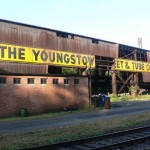A few weeks ago, a Friend in my meeting approached me, and in the gentlest and tenderest way possible, suggested that some of what I had spoken in meeting for worship was less Spirit-led ministry and more a need to seek and receive support for personal burdens.*
I am still holding this Friend’s concern close to me. For those who don’t already know: messages in a Quaker meeting are, at least in theory, prompted not by our personal lives, however keenly felt, nor by our own thoughts and ideas, but by Spirit. Friends describe a variety of discernment tools for gauging which promptings are rooted in Spirit, and which are not, and, having attended a few “meetings for good ideas,” I can say with no question that I prefer meeting for worship.
It is a painful thought, that I might have spoken from any root but a leading of Spirit. I am trying to respond neither with defensiveness and a hasty denial that I might do such thing, nor a wash of shame and an immediate acceptance that the Friend’s suggestion must be correct simply because it was made at all.
The truth is, I do speak often in meeting for worship, and I do speak often from the sometimes painful edges of my personal experience. On the other hand, I’m confident that I do not generally turn to speaking in meeting as a substitute for other forms of support and discernment in my life–because I know I have good support for my emotional needs.
However, it is true that I speak easily and freely, and that I don’t have a lot of shyness around public speaking to hold me back. What’s more, I am not one of those Quakers who feels great reluctance to speak in meeting; when Spirit does move me to stand and share a message, I love the feeling of it–not for the attention I garner, but for the deep joy flowing through me with the nearness of Spirit.
That’s not a problem… but it is reason to be wary of speaking too freely and too often. I may do that. I need to be open to that possibility, and go carefully.
However, I’ve heard it said that genuine vocal ministry will avoid the words I, me, or my. This, I think, is untrue.
It’s a fact that the writings of early Quakers–including their memoirs–seem oddly impersonal by the standards of a modern reader, and I’m certainly not implying they were “doing it wrong.” But perhaps the place of the Bible in the early Quaker movement, much more familiar than it is in modern Quaker meetings, allowed for personal identification with the characters of that book. In the stories of the struggles of figures like Job, or Moses, or Saul and David, I suspect early Quakers were able to see their own struggles reflected, and that what today seem like fleeting and indirect mentions of this passage or that would bring up whole stories and states of mind for early Friends.
I don’t think that Biblical allusions accomplish that in modern meetings, even where all Friends present might be Christian.
Partly for that reason, I think that there is a place for the personal, the experiential, the subjective, and the real in vocal (or written) ministry today: for I, me, and my.
I know that such ministry is often what touches me the most, whether from a Friend in my meeting, or a Quaker or Pagan blogger, or a published mainstream author, like Anne Lamott. I respond best to spiritual witness that is personal, real, and vulnerable.
I am aware that I have made such messages something of a stock in trade, here as well as in worship. I’ve come to think of it, in fact, as a ministry of brokenness.
It’s not that I’m reluctant to share my joys too, but I think that my best writing often comes out of my fear and pain–my weakness, and not my strength. I think I just sense the nearness of Spirit more clearly when I am afraid–and I think Spirit speaks through me best when I allow that sense of vulnerability and brokenness to be visible, not safely tucked away.
I often speak and write from that place.
A number of us at my meeting have begun exploring something going under the name “Spiritual Accountability Groups.” The idea of spiritual accountability is that, in a religious practice that is grounded in community as well as in Spirit, we owe one another a duty to help each other discern how best to be faithful to that Spirit–to give and receive what corporate (in the old-time Quaker sense of “the body” of a church community, not in the newer sense of CEOs) help we can.
This is a touchy notion in a society as individualistic as that of modern America, even in the context of the Religious Society of Friends, a group with 350 years of practice in corporate spiritual techniques. It can be hard to speak in any language of things as inchoate and personal as leadings and gifts. (I know it is for me–far more than speaking of my struggles and faults!)
And it can be frightening to name these stirrings to others if we are not sure they know how to listen deeply before rushing to judgment.
This is tender work, and real pain could result either from an accountability group deteriorating into advice-giving, condemning, or even flattering or praising without really understanding a leading being shared.
On the part of a listener, there’s a need to move slowly and listen deeply, and to stay low while we do so. And on the part of a sharer, there’s a need to be courageous, and to speak the truth as clearly and with as little gloss as we can manage, holding all things up for clear-eyed examination together in Spirit.
I was speaking with another Quaker engaging in this process, who is beginning to feel the stirrings of a newly-named gift, and contemplating contacting others who are said to have similar gifts. She spoke of her fear and her hesitancy in doing so. (I very much had the sense that her naming her fear was not in order to be reassured, but for the same reason a Buddhist names a powerful emotional state: in order to see it clearly and not be controlled by it.)
We sat with that for a bit–I have no doubt she will make those calls if and when it is right for her to do so, for she is a remarkably courageous woman.
Then I commented that, when I feel what seems to me to be a similar fear, I write about it. And then I publish it on the World Wide Web.
She laughed, with a sudden, ringing laugh. It sounded like a laugh of startlement, even a laugh of recognition–though it might have been recognition of difference as much as similarity.
It is pretty funny, when I think about it.
But this is how I name my demons. I mean, once you’ve put them onto the Internet, for everyone who knows you, including your mother, to see, well, what is left to be afraid of after that, right?
I do not mean to imply that simply being publicly vulnerable is the same thing as vocal ministry. I am told–though it was well before my time–that there was a bit of a fad during the 1970’s for using meeting for worship as if it was an encounter group, with lots of personal confessions that were… well, personal. TMI–too much information. I don’t want to contribute to that, and I don’t want to be guilty of that–though in truth, I don’t want to be guilty of speaking what is not a Spirit-prompted message in worship ever, at all.
I want to be faithful.
And for me, part of what keeps me faithful is my willingness to be thoroughly visible, warts and all. I’m not advocating exhibitionism. Radical plainness of presence, maybe?
I’m not actually strong enough to allow the whole world to be my spiritual accountability committee. I know that: I flare up in instantaneous anger around some people, and there are ways of communicating I find so alienating that I’m almost unable to listen beneath them to the heart of the person who is using them.
But allowing the world to step forward and tell me when I put my foot wrong has been very useful to me in developing a kind of 24/7 Quaker practice. I would not say that I feel the Presence of the Light of Peace every minute of every day, nor anything like it. But I do feel it a lot, and especially when I’m writing.
That doesn’t make everything I write a message. But my willingness to be open and vulnerable, and my sense of the nearness of Spirit as I write… does make some of what I am writing here a kind of ministry.
Sometimes I do write about my brokenness and my struggles because I trust you, my readers, to help shine light on my dark places.
But also, very often, I write them because I know that not only is this what so often speaks to me in the words of others, but because I know that my words do often speak to others in that same way.
I know because you have told me so. But even more importantly, I also know because sometimes–not all the time, but sometimes–I can feel the weight of Spirit moving in my chest as I write. I feel an urgency that has nothing to do with the personal, despite the fact that what is personal is what my stories are couched in.
At those times, I can feel a kind of joy when the words leave my lips in meeting, or when I hit “publish” on my blog. It’s like watching the flight of an arrow that has left the bow, and I don’t want praise for it, or admiration, or envy. I just want that arrow to fly true.
 |
| Glenn Larson |
There is a place in my work for caution, discernment, and self-questioning. And there is a place in that work for sudden laughter, lightness, and watching something that shines as it cuts through the sky.
*I should probably note that this Friend has a history of service on our Ministry and Worship committee–is, in fact, recognized for a kind of gift in eldering–and has also enough of a relationship with me that she could know of my longstanding concern for ministry, and that I would want her to speak to me as she did. Generally speaking, most liberal Quaker meetings have a committee which undertakes to provide feedback–“eldering”–where it is needed, and individual members are discouraged from approaching one another with even implied criticism of vocal ministry.
This was an example, in my opinion, of genuine and loving eldering. My Friend was faithful. I am attempting to be faithful, too, in really sifting and discerning her insights.
I do not, however, want to give the impression that “vigilante eldering” is in any way a good idea. This is sensitive work, only to be undertaken in great love and humility, and ideally, after discernment and prayer.
var fctb_tool=null; function FCTB_Init_d507509ac1a6434cae3b054b1714e6bc(t) { fctb_tool=t; start(fctb_tool); }
var fctb_tool=null; function FCTB_Init_5ced0799afc2574897e38d7acb6d20f8(t) { fctb_tool=t; start(fctb_tool); }
var fctb_tool=null; function FCTB_Init_18f28e7a112aaa4bb188283ec2b5080f(t) { fctb_tool=t; start(fctb_tool); }
var fctb_tool=null; function FCTB_Init_be1917fc795cbd408446d7882c4e03b1(t) { fctb_tool=t; start(fctb_tool); }
var fctb_tool=null; function FCTB_Init_0a7689ae5ffca6499b786f0f1a181a51(t) { fctb_tool=t; start(fctb_tool); }
var fctb_tool=null; function FCTB_Init_d4346b02ac1ed14e80eb9bbbe8d7bcfb(t) { fctb_tool=t; start(fctb_tool); }
var fctb_tool=null; function FCTB_Init_f054fc88d171074c88dafc743732534d(t) { fctb_tool=t; start(fctb_tool); }















